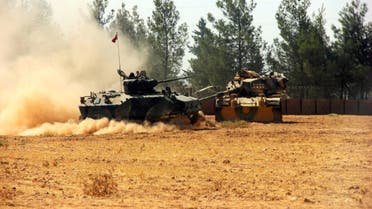Ankara-backed Syria rebels: Jarablus ‘liberated’
A rebel commander with the Failaq al-Sham group said most of ISIS fighters in Jarablus had pulled out, some of them surrendering
In an operation backed by Turkish shelling, Syrian rebels said on Wednesday that Jarablus in northern Syria on the Turkish border has been “libeated” from ISIS militant group.
“Jarablus is completely liberated,” Ahmad Othman, commander of the Sultan Mourad rebel group, told AFP from the scene, while another rebel spokesman said ISIS fighters had fled towards Al-Bab, to the southwest.
Earlier, a rebel commander with the Failaq al-Sham group, who requested anonymity, told Reuters that most of ISIS fighters in Jarablus had pulled out, some of them surrendering. Another commander estimated up to 50 percent of the town was now under the control of the Turkish-backed rebels.
“Daesh (ISIS) fighters have withdrawn from several villages on the outskirts of Jarablus and are heading south towards the city of al Bab,” the Failaq al Sham commander said.
After a pre-dawn barrage of heavy artillery and airstrikes, Turkey sent tanks and special forces into Syria on Wednesday to help clear a border town of ISIS militants and prevent Kurdish rebels from making any gains, marking the NATO member’s most significant military involvement so far in the Syria conflict.
The operation -- named “Euphrates Shield” -- began around 4:00 am (0100 GMT) with Turkish artillery pounding dozens of ISIS targets around Jarablus, the Turkish prime minister’s office said.
Turkish tanks and special forces accompanied by pro-Ankara Syrian rebels then rolled across the border in an unprecedented operation to drive ISIS out of the town from which it has fired rockets into Turkey.
Hours after the start of the operation, Turkey’s state-run news agency and a Syrian opposition media activist said the rebels captured Kaklijeh - an ISIS-held village near Jarablus - with the support of Turkish armored units. The village is some 3 kilometers (1.8 miles) from the Turkish border, the Anadolu Agency said.
Turkish President Recep Tayyip Erdogan said the military operation aims to prevent threats from “terror” groups, including ISIS and a US-backed Syrian Kurdish militia affiliated with Turkey’s outlawed Kurdish rebels.
Erdogan said the operation was in response to a string of attacks in Turkey, including a suicide bombing at a wedding party near the border that killed 54 people.
Wednesday’s dual-purpose operation puts Turkey on track for a confrontation with the US-backed Kurdish fighters in Syria, the most effective fighting force against ISIS in the area.
Turkey is concerned about the growing clout of the group, which it says is linked to Kurdish groups waging an insurgency in southeastern Turkey.
A senior official with Syria’s largest Kurdish group suggested Turkey will pay the price. Saleh Muslim, the co-president of the Democratic Union Party or PYD, tweeted that “Turkey is in Syrian Quagmire. Will be defeated as Daesh” will be. He used the Arabic language acronym for ISIS.
The latest developments have thrust Jarablus into the spotlight. The town, which lies on the western bank of the Euphrates River where it crosses from Turkey into Syria, is one of the last important ISIS-held towns between Kurdish-controlled areas in northern Syria. It is located 20 miles (33 kilometers) from the town of Manbij, liberated from IS by Kurdish-led forces earlier this month.
Taking Jarablus and ISIS-held town of al-Bab to the south would be a significant step toward linking up border areas under Kurdish control on both sides of the Euphrates.
Turkish Foreign Minister Mevlut Cavusoglu said Syrian Kurdish forces “must as soon as possible cross to the east of the Euphrates.”
“That’s what the United States promised. That was our agreement,” he added. “Otherwise, and I say this clearly, we will do what is necessary.”
The US military, using manned and unmanned aircraft, conducted eight air strikes on Wednesday against ISIS in Jarablus, a US official said.
Reuters previously reported use of A-10 “Warthog” ground attack aircraft and F-16 fighter jets in the operation.
The official said drone aircraft also participated in strikes, which were still ongoing. The operation marks Turkey’s first major US-backed incursion into Syria.
Meanwhile, the United States has been encouraging Turkey to close its border with Syria, a White House spokesman said, commenting on Turkey’s first major US-backed incursion into its southern neighbor launched on Wednesday.
“The United States has been encouraging the Turks for some time to take decisive action to close the Turkey-Syria border, particularly this portion of the border,” White House spokesman Josh Earnest said at a White House briefing.
Russia’s foreign ministry also expressed deep concern on Wednesday at Turkey’s military operation in Syria.
“We are deeply concerned at what is happening in the Syrian-Turkish border area,” the ministry said in a statement, warning this could lead to “further degeneration of the situation in the conflict zone" and "flare-ups of inter-ethnic tensions between Kurds and Arabs.”
The Syrian government denounced the Turkish military incursion and called for an immediate end to what it described as a “blatant violation” of Syrian sovereignty. It said Turkish tanks and armored vehicles crossed into Syria under the cover of US-led airstrikes.
Turkey’s private NTV television, which said that up to 20 Turkish tanks crossed the border, earlier Wednesday reported that a small number of Turkish special forces had crossed into Syria as part of the operation. NTV called it an “intruder mission” meant for “pinpoint operations” against ISIS in Jarablus.
Turkish Prime Minister Binali Yildirim’s office said the whole operation began at 4 a.m. (0100 GMT), with intense Turkish artillery cross-border fire on Jarablus, followed by Turkish warplanes bombing IS targets in the town, Anadolu said.
The Syrian Observatory for Human Rights, an opposition activist group that monitors the civil war, said Syrian rebels who were amassed at the Turkish border crossed into Syria, preceded by Turkish tanks and mine sweepers.
Ahmad al-Khatib, a Syrian opposition activist embedded with the rebels, said some 1,500 opposition fighters were involved. He said the fighters come from the US-backed Hamza brigade, as well as rebel groups fighting government forces in Aleppo, such as the Nour el-Din el Zinki brigade, the Levant Front, and Failaq al-Sham.
Fighters from the powerful and ultraconservative Ahrar al-Sham brigade are also present, he said and confirmed Anadolu’s report that the rebels seized the IS-held village of Kaklijeh near Jarablus.
Later Wednesday, three wounded Syrian opposition fighters were taken back to Turkey, to the city of Gaziantep for treatment, according to Dogan news agency.
There was no immediate word on any fatalities in Wednesday’s operation. Just a few hours after it started, Vice President Joe Biden landed in Ankara for talks that include developments in Syria.
Biden’s visit comes at a difficult time for ties between the two NATO allies - Turkey is demanding that Washington quickly extradite a US-based cleric blamed for orchestrating last month's failed coup while the United States is asking for evidence against the cleric and that Turkey allow the extradition process to take its course.
In a joint press conference with Yildirim in Ankara on Wednesday, Biden attempted to make peace, saying he understood the “intense feeling” in Turkey over the cleric, and expressed his guilt for not coming to the country sooner after the coup.
The US vice president also indirectly expressed his support for the Turkish operation launched Wednesday to clear ISIS militants from the town of Jarablus and deter Kurds from further expanding in northern Syria.
He called on Syrian Kurdish forces to “move back across the Euphrates River,” warning that they could lose US support if they did not.
Yildirim, meanwhile, vowed that the Turkish operation in Syria will go on until Kurdish rebels move east of the Euphrates.
In recent days, Turkey increased security measures on its border with Syria, deploying tanks and armored personnel carriers. On Tuesday, residents of the Turkish town of Karkamis, across the border from Jarablus, were told to evacuate after three mortars believed to be fired by IS militants landed there, Dogan reported.
Turkey has vowed to fight ISIS militants at home and to “cleanse” the group from its borders after a weekend suicide bombing at a Kurdish wedding in southern Turkey killed at least 54 people, many of them children. Turkish officials have blamed ISIS for the attack.
The Kurdish-led group known as the Syria Democratic Forces, or SDF, recaptured the town of Manbij from ISIS earlier this month, triggering concerns in Ankara that Kurdish forces would seize the entire border strip with Turkey. The US says it has embedded some 300 special forces with the SDF, and British special forces have also been spotted advising the group.
The Kurds’ outsized role in the Syrian civil war is a source of concern for the Syrian government as well. Fierce clashes erupted between the two sides over control of the northeastern province of Hasakeh last week, and Syrian warplanes bombed Kurdish positions for the first time, prompting the US to scramble its jets to protect American troops in the area.
The Syrian government and the Kurds agreed on a cease-fire Tuesday, six days after the clashes erupted. The Kurdish Hawar News Agency said government forces agreed to withdraw from Hasakeh as part of the truce.
Syrian state media did not mention any withdrawal, saying only that the two sides had agreed to evacuate the wounded and exchange detainees. Government and Kurdish forces have shared control of Hasakeh since the early years of the Syrian war.
(With AP, Reuters)
-

Syrian rebels prepare to attack ISIS town from Turkey
The rebels are expected to assault Jarablus from inside Turkey in the next few ... Middle East -

Turkey: Syria border region must be 'cleansed' of ISIS extremists
Turkey was long accused of turning a blind eye to or even abetting the rise of ... Middle East -

Turkey PM urges world powers to turn ‘new page’ on Syria
Yildirim’s comments came after as activists said hundreds of Ankara-backed rebels ... Middle East -

Turkey: More active role to be taken in Syria
Turkey fears the strengthening of Kurdish militant groups in Syria will further ... Middle East
